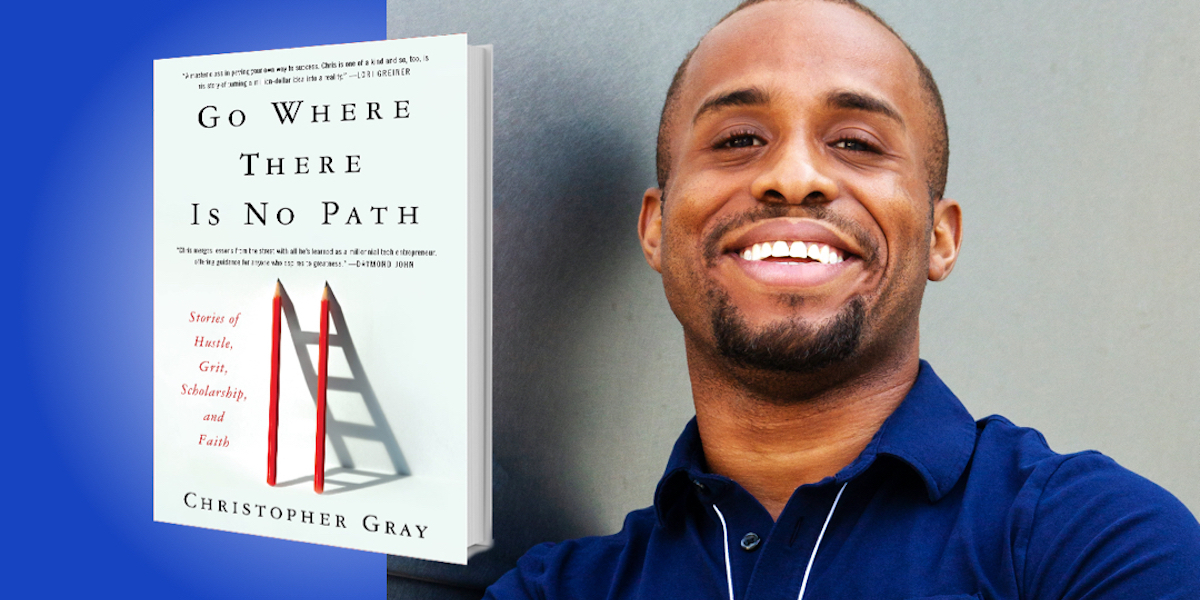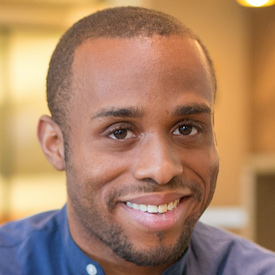Christopher Gray, co-founder and CEO of college scholarship app Scholly, is a regular contributor to Forbes magazine and has made the top of the 2016 Forbes 30 Under 30 List for Social Entrepreneurship. He was one of Oprah’s Inaugural Super Soul 100 honorees as one of her favorite people, and is the recipient of the 2016 Smithsonian American Ingenuity Award. A highly in-demand public speaker, Chris has served as the U.S. Embassy Speaker for the U.S. State Department.
Below, Christopher shares 5 key insights from his new book, Go Where There Is No Path: Stories of Hustle, Grit, Scholarship, and Faith (available now from Amazon). Listen to the audio version—read by Christopher himself—in the Next Big Idea App.
1. Persistence is key.
There are no shortcuts to success, especially for an entrepreneur. Every time you see a company selling for hundreds of millions of dollars or having an IPO, you could start to believe that entrepreneurship is a straightforward path with nothing but hockey stick growth. Oftentimes, however, that is not the case. Sometimes you will succeed, and sometimes you will fail. That’s a part of the journey of starting a company, or taking any sort of risk, for that matter. Regardless, you have to be persistent and keep pushing until you make it.
There was a time when the Lyft founders had only a few months of cash left in the bank, and an investor told them to quit. But they persisted, and they succeeded. The founders of Airbnb had to beg investors for funding in their early days, and they even sold cereal to make ends meet. Despite their struggles, look where they are today. Again, there are no shortcuts to success; persistence is key.
“At some point, your personal life and your professional life become one, especially as an entrepreneur.”
2. Social capital is everything.
For whatever you don’t have in financial capital, make up for it in social capital. In other words, network like crazy—because when you build meaningful relationships with like-minded people, you create a community that will help empower both your career and personal goals.
Networking has been one of the most important parts of my life, from being the last student in the auditorium to walk up and ask the speaker for their business card, to working at a venture capital firm for three years, to getting my first investment in Scholly after a 15-minute conversation. At some point, your personal life and your professional life become one, especially as an entrepreneur. Friends become business partners, investors, advocates, donors, and more, so surrounding yourself with the right people matters.
3. Product is king.
Whether you are creating a technology company, a physical product, a book, or a piece of art, your product will always be your best salesperson. If a customer uses your product and loves it, they will naturally tell others to use it as well. No matter how much press you get, panels you do, or ads your team runs, if your product isn’t great, it won’t succeed. No press, fundraising, or finesse can make up for a poorly designed product or bad content.
“No matter how much press you get, panels you do, or ads your team runs, if your product isn’t great, it won’t succeed.”
So before starting a company, take your time to study your customers, understand their pain points, and incorporate those needs into your product’s design and functionality. Then keep testing the product, and make changes or even pivot if there isn’t a product-market fit. It’s very much okay to adjust to the needs of the market you are trying to serve.
Scholly’s user base has mostly grown through word of mouth. Either a student, parent, or high school guidance counselor uses the product, and then encourages others to use it as well. Yes, Shark Tank was a great moment for us—but the fact that we created a product that has had a measurable impact on the lives of students across the country is what was the biggest selling point. Word of mouth is powerful, and having a product that serves the needs of our customers is everything.
4. When there is no way, make a way.
Being a Black man in America is hard. You are told that you won’t make it to college because of the cost, or because you are not good enough. You are told not to start a business because you won’t have access to capital to start, build, and scale your vision. And even after you are successful, you still deal with microaggressions.
Poverty, systemic racism, and sometimes your sense of self stand in your way. Regardless, you have to keep pushing.
“As recipients of less than 1% of venture capital raised, Black founders find that systemic racism is always at play in our lives.”
When I didn’t have a computer to apply for some of my scholarships, I pulled out my cell phone and wrote some of my essays from my keypad and submitted them. When I couldn’t raise capital for Scholly initially, I pitched at pitch competitions, found grants through my university, and got the funding I needed. When someone told me no, I simply spoke to others until I got a yes.
Don’t get me wrong—some may think you are successful because of your struggle. But the truth is, you are successful despite those struggles. Your strength, perseverance, and resilience helped you find your way to success.
5. Black founders matter.
As recipients of less than 1% of venture capital raised, Black founders find that systemic racism is always at play in our lives. But after almost eight years of my entrepreneurial journey, I have built a profitable company, created jobs for people of color, and created a diverse and inclusive company culture that has changed many lives.
Black founders remove the need for other corporations to see our value, hire us, and promote us, because we can create jobs of our own and brands that command respect. My journey as an entrepreneur has taught me that while Black lives will always matter, Black founders matter too—they create jobs, wealth, community, and visibility into a type of success that young Black boys and girls can aspire to.
To listen to the audio version read by Christopher Gray, download the Next Big Idea App today:
































